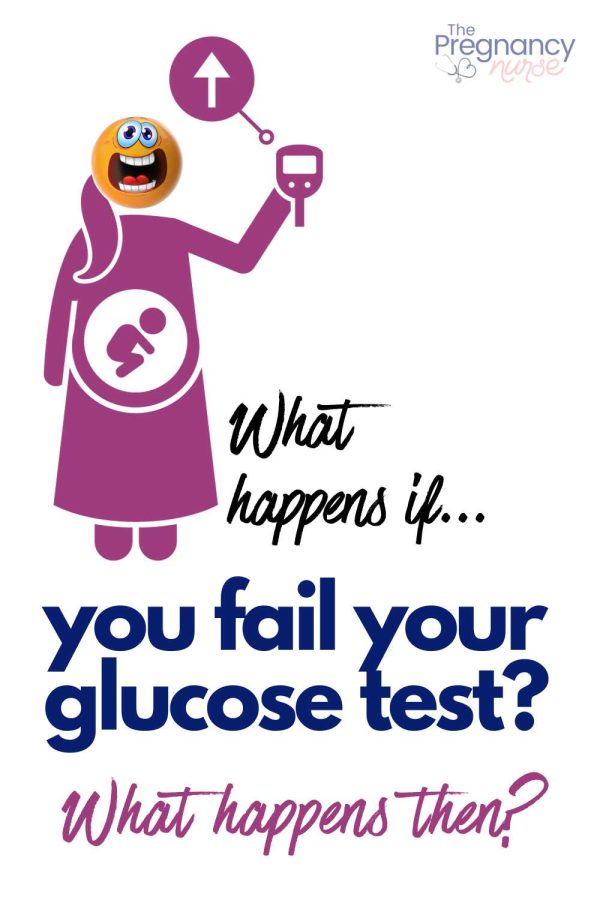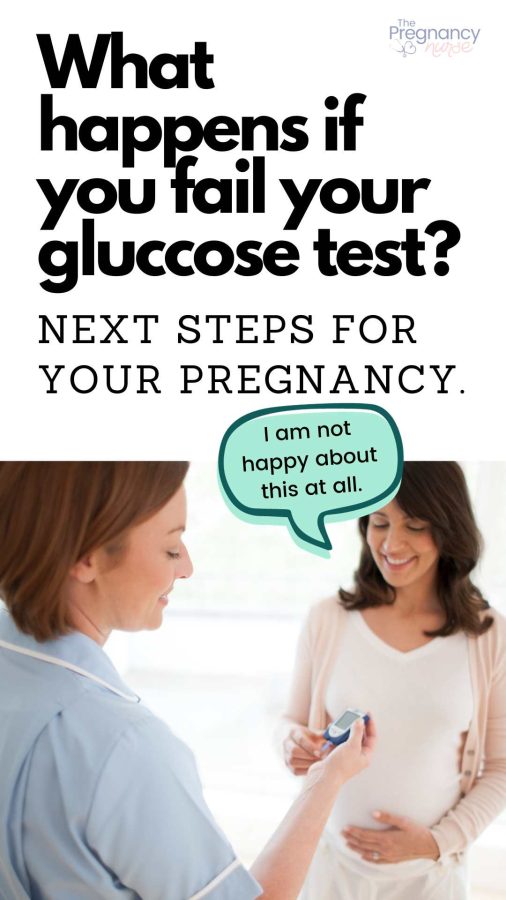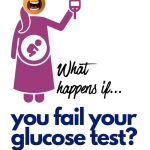Ok, you’ve failed (or thought about failing) your 1-hour glucose test? What happens now? There are a couple of ways it could go (including taking the longer 3-hour glucose drink), but mostly I’m glad you’re here wondering what will happen. Taking this seriously is one of the smartest things you can do in your pregnancy — so let me give you the next steps!
As a note: I failed the glucose test a number of times. It absolutely sucked. So I get. you!
Pro Tip: if you’re looking at your third trimester, now is also the time to get one of these!

What happens if/when you fail your 1-hour glucose screening?
There are two options.
For most people, they will recommend the 3-hour oral glucose tolerance test (sometimes called glucose screening test, or a glucose challenge test or OGTT). We’ll talk more about that in a bit.
For some people, who fail it by a lot they will just diagnose you with gestational diabetes mellitus (GDM). That means you’ll then visit a dietician and come up with a way to control this with diet. If that doesn’t work they will then work on medications (most often oral, although some people will need insulin now and then) to help control it. You’re just basically skipping the 3-hour test because you will most likely fail it.
Pro Tip: most of this info is from the United States. I have heard of other countries that just start with a 2-hour test, but in the US the standard of care is to offer the 1- hour test and then if you fail that, do the 3-hour test.
What’s the Three-Hour Glucose Test?
It’s a lot like the first test, but it’s 3 hours (2 hours longer)
I believe all providers want a fasting glucose, which means you’ll want to do this test early in the morning as you won’t be able to eat until you’re done.
They will take your blood glucose upon arrival (checking your fasting blood glucose level), and then will have you drink a more sugary glucose solution than last time (it has more sugar in it than before). You’ll then have a blood draw a one hour, two hours and a final one at 3 hours.
Then you’ll want a nice snack that balance carbs and proteins. I always did a PB&J sandwich as it had some proein with the peanut butter, and lots of carbs to help carry you through until you get home and have an actual meal.
It is REALLY important that you not eat or drink anything during the test. Some places will allow small sips of water, but if you were to eat during the test it will nullify the results and you’ll have to start over.
The lab will test these blood samples for the glucose level in your blood as insulin kicks in. The hope is that your blood glucose levels go down nicely as time goes by. The test result is normally reported by the next day (although it varies on when you will get the information).
Fun fact: You can fail one of the 3-hour tests and still not be diagnosed with GDM, just failing one in the 3-hour glucose challenge test isn’t enough to diagnose you.
You may be thinking this is just ONE MORE THING. I get that. I think there’s so much to do and think about in pregnancy. However, I think every pregnant couple needs a birth class to have the best hospital birth they can. I recommend this one. Here’s why:
- It can be done in just a few hours because I know you’re busy
- Created for couples because I know you want a teammate, not just a cheerleader
- Created by an expert you’ll be prepared for most hospital scenarios (because I know you LOVE feeling prepared — that’s why you’re here).
What if I fail the 3-hour glucose test?
Valid question, but I want to be really clear that just because you failed the 1-hour does NOT mean you’ll likely fail the 3-hour.
As far as I can tell, about 25% of the people fail the 1-hour glucose test, and only 2-10% of people are ultimately diagnosed with gestational diabetes. So this isn’t a time to catastrophize and worry about what life will be like diabetic. Let’s just take each step at a time.
BUT, if you ultimately fail the 3-hour test you’ll be diagnosed with gestational diabetes.
They will encourage you to check your blood sugar in the mornings and after every meal. If those numbers continue to be high, even when you’re eating the proper diet, they may recommend medication like metformin or possibly insulin depending on how off the numbers are. If your blood sugar are in the in the normal range, they will encourage you to continue the diet they recommended (usually a certain # of grams of carbs in each meal, balanced with protein).
The VAST majority of people who have gestational diabetes control it with diet alone, and don’t need insulin shots or even oral meds.
Pro Tip: SO many people think they were mis-diagnosed with GDM because their levels remain very stable on the diet. But GDM could progress quickly as you progress in your pregnancy so it’s really important you keep an eye on it. The glucose test are just our best way to check for who’s at risk.
I would give a plug here to see a dietician to learn about how to best eat if you are diagnosed with gestational diabetes. Many providers try to handle it on their own, but a dietician visit would be the gold standard of care. Often these can even be done remotely. Even if your doctor wants to “handle” it on their own, you could ask them if there’s someone you could see to really dial in your diet.
OR you could just use the glucose monitor, and see how your sugars are. The big hope is that your sugars will remain in the suggested guidelines and with small modifications you’ll have a term, healthy pregnancy.
I recommend a dietician because they can really help you with some life-long guidelines to help your eating habits. Dieticians are an under-used resource!
I think diet is so important, I actually have a dietician teach a bonus video in here to talk about balancing carbs and proteins for ALL pregnant people! So helpful!
Looking to get prepare for your birth? I have some easy options for you!
~~~~~~~~
– Worried you’re missing something? Grab my pregnancy planner so you don’t miss a thing!
– Thinking about an induction? Grab Inductions Made Easy to feel prepared in just 20 minutes!
– Wondering how to get that baby OUT? Grab Going Into Labor Made Easy so you know how to (and not to) do it!
– Postpartum got you anxious? Check out Postpartum Care Made Easy so you can stay SAFE even when all your attention is on that little on.
🚨 AND if ALL OF IT has got you on edge The Online Prenatal Class for Couples is perfect for you — You’ll feel so ready before you even know it!
~~~~~~~~
No matter WHERE you are at in your pregnancy journey, we have resources that can help!
Is there an alternate test?
Man, I wish. There are various reasons why they have to do this test this way…. which really stinks because I agree it’s HORRIBLE. I FEEL horrible after it and it frankly isn’t awesome for our bodies. But, because it’s a one-time test and it can tell if we’re going to have issues further down the road.
If you absolutely don’t want to take the 3-hour test talk with your provider. Some recommend taking your blood sugar a few times/day for a few weeks to see what the results are. Many people would prefer that to the 3-hour test, so see what works for you after discussing it with your provider.
Unfortunately, the only one studied well is doing the 3-hour test as it is now.
Want to know more about the glucose test — check out these posts:
- Avoid Failing the Glucose Test During Pregnancy
- What to Eat Before Your Pregnancy Glucose Test
- Your Glucose Test During Pregnancy: How to pass it.
- Signs You Passed Your Glucose Screening Test During Pregnancy
- The WORST Parts of Pregnancy

What else happens?
You may have an extra anatomy ultrasound, BPP’s and NST’s.
Understanding your third trimester testing is SO important. It is often where interventions start, and understanding the ROOT of them, will help you make better choices.
If you’re diabetic there are good chances of more interventions with your pregnancy, or at least being offered them (like being induced early). It’s really important you know how to talk with your team to get the information you need to make choices as you head towards to your due date. The Online Prenatal Class for Couples is the easy way to get prepared for all of that. You’ll feel so much more prepared and confident for what you might face (it includes that information on testing you might have done too).
I know a lot of people take a diagnosis of gestational diabetes as a death sentence, but the vast majority of people resume their regular eating patterns after they have the baby. It doesn’t mean that you shouldn’t watch your blood sugars and how you eat afterwards.
If you have gestational diabetes you do have a higher risk of having diabetes as you get older. Being pregnant puts similar strain on your cells as getting older, and this can be a map of what to expect as you age. So, take it seriously, but also be aware that life is going to go on.
Some people may be diagnosed with type 2 diabetes after pregnancy if sugar levels continue to be abnormal. Most often they recommend a 2-hour glucose tolerance test 6-12 weeks after delivery to see if you have lingering blood sugar level issues.
I really did want to give you a pat on the back for taking this test during pregnancy. SO many people just stick their head in the sand or say the test has too many preservatives so they don’t want to take it. but undiagnosed diabetes in pregnant women does puts you at risk for severe complications for you and baby including stillbirth. So I’m so glad you’re taking your recommend tests between 24 and 28 weeks of pregnancy.
And, like I said — if you’re at the point where you’re taking these tests you’re at the PERFECT spot to get your prenatal class in. Studies show it reduces your chance of a C-section or other interventions at birth so come join me in here.
Looking to get prepare for your birth? I have some easy options for you!
~~~~~~~~
– Worried you’re missing something? Grab my pregnancy planner so you don’t miss a thing!
– Thinking about an induction? Grab Inductions Made Easy to feel prepared in just 20 minutes!
– Wondering how to get that baby OUT? Grab Going Into Labor Made Easy so you know how to (and not to) do it!
– Postpartum got you anxious? Check out Postpartum Care Made Easy so you can stay SAFE even when all your attention is on that little on.
🚨 AND if ALL OF IT has got you on edge The Online Prenatal Class for Couples is perfect for you — You’ll feel so ready before you even know it!
~~~~~~~~
No matter WHERE you are at in your pregnancy journey, we have resources that can help!
And, if you’re not quite sure you’re ready for that whole thing, check out my free lesson for you. It’s your first step toward getting in the driver’s seat of your birth.
This is just a part of my series on The Pregnancy Glucose Test For Gestational Diabetes << be sure to read that post for ALL the info on that important test!







 What Cervix Dilation Should You Be at 36 Weeks of Pregnancy?
What Cervix Dilation Should You Be at 36 Weeks of Pregnancy?
